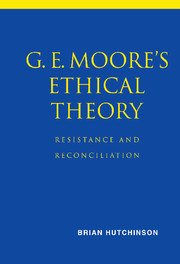Book contents
- Frontmatter
- Contents
- Introduction: Irony, Naïveté, and Moore
- 1 Simplicity, Indefinability, Nonnaturalness
- 2 Good's Nonnaturalness
- 3 The Paradox of Ethics and Its Resolution
- 4 The Status of Ethics: Dimming the Future and Brightening the Past
- 5 The Origin of the Awareness of Good and the Theory of Common Sense
- 6 Moore's Argument Against Egoism
- 7 The Diagnosis of Egoism and the Consequences of Its Rejection
- 8 Moore's Practical and Political Philosophy
- 9 Moore's Cosmic Conservatism
- 10 Cosmic Conservatism II
- Bibliography
- Index
4 - The Status of Ethics: Dimming the Future and Brightening the Past
Published online by Cambridge University Press: 28 July 2009
- Frontmatter
- Contents
- Introduction: Irony, Naïveté, and Moore
- 1 Simplicity, Indefinability, Nonnaturalness
- 2 Good's Nonnaturalness
- 3 The Paradox of Ethics and Its Resolution
- 4 The Status of Ethics: Dimming the Future and Brightening the Past
- 5 The Origin of the Awareness of Good and the Theory of Common Sense
- 6 Moore's Argument Against Egoism
- 7 The Diagnosis of Egoism and the Consequences of Its Rejection
- 8 Moore's Practical and Political Philosophy
- 9 Moore's Cosmic Conservatism
- 10 Cosmic Conservatism II
- Bibliography
- Index
Summary
Dimming the Future
This chapter continues the work of Chapter 3 by considering what a more realistic assessment of both the past and future of ethics will look like once we reject Moore's explanation that the difficulties of the field have been due to the endless making and remaking of a simple mistake. For the most part, Moore's account posits an ethical future whose brightness is matched only by the darkness of its past. But the denial of his claim that a simple mistake, in a plethora of forms, has made for a violent rupture in the consciousness of value enables the contrast between the past and future of ethics to be made much less stark. First, Moore's dawn of the century optimism receives a cold but welcome dose of reality. Since the publication of Principia, ethics has not benefited from an epochal breakthrough. Its difficulties and complexities continue to make such a breakthrough highly unlikely. At the same time, the reasons for tempering his optimism about the future are reasons for allaying his pessimism about the past. The numberless errors of previous generations of philosophers are what we should expect from the application of fallible, if impressive, intellect to a difficult domain. The future is not so bright nor the past so dark as this still young philosopher thinks.
- Type
- Chapter
- Information
- G. E. Moore's Ethical TheoryResistance and Reconciliation, pp. 78 - 92Publisher: Cambridge University PressPrint publication year: 2001



